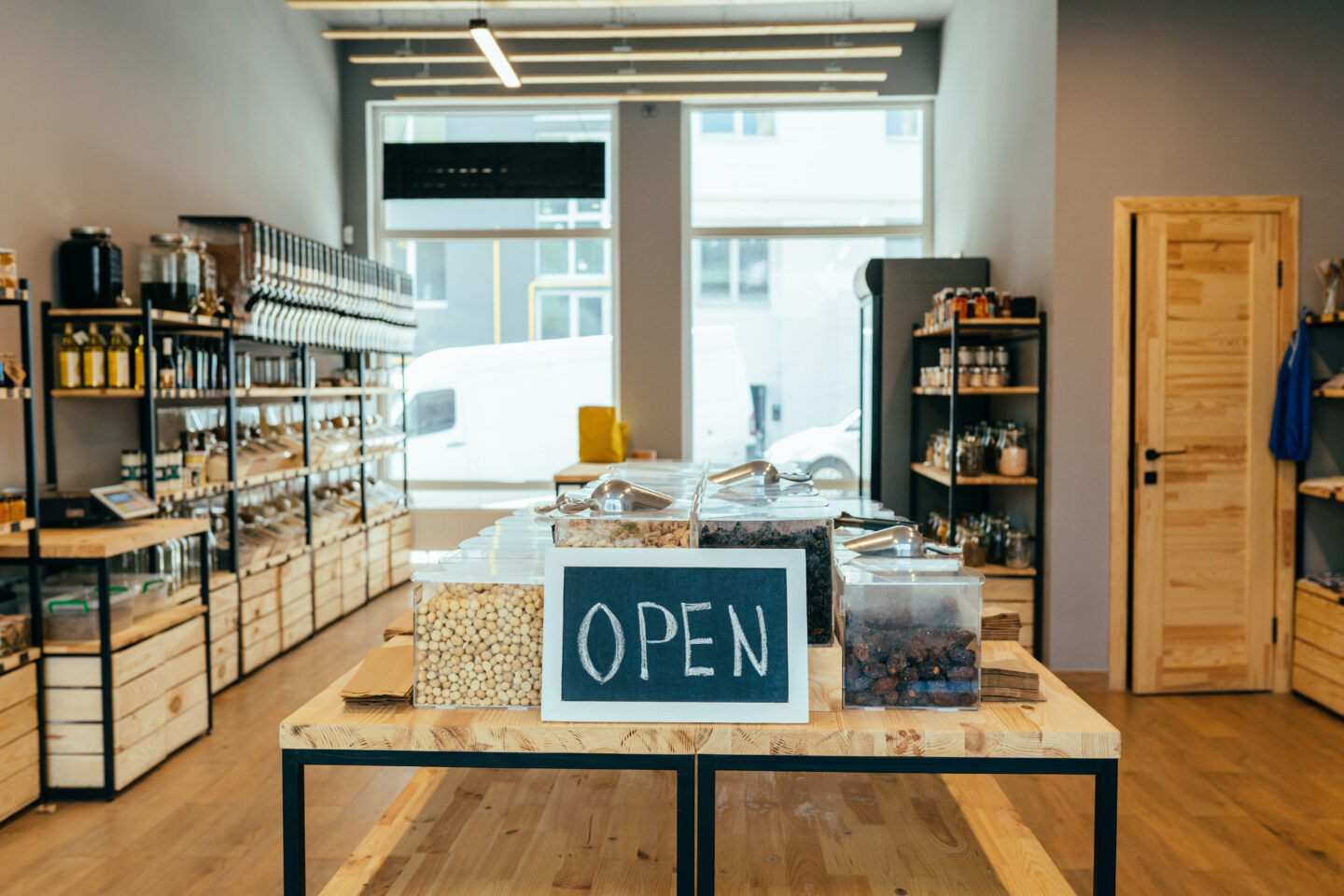

Set up your shop
Create my project

How to open a grocery store : start with these 15 simple steps
9 December 2022
Opening a grocery store is an exciting opportunity to venture into the business world. Grocery stores are one of the few businesses where there will always be demand, which is why it’s such an exciting and appealing retail opportunity.
Grocery stores are also one of the few business ideas that are of a low-risk endeavour and do not require huge start-up costs. It is historically a very stable venture. Although there are grocery stores on every street corner, this does not mean that the market is saturated. The food retail business is booming and is expected to grow further into the future, with many niche markets to explore : exotic food, gourmet and fine dining, organic and vegan produce, and much more. There is plenty of room for new grocery store businesses to thrive. Read on to discover some of the essential tools and elements to consider when opening a grocery store.
The first 3 steps to take when opening a grocery store
Food consumers love to shop in convenient and local grocery stores, as it can give them everything that they need in one place. Getting the right products to the right people is the most important thing when it comes to grocery stores.
Before opening a retail store, a plan and strategy should always be put in place. Paperwork, suppliers, products, and location are just a few fundamental steps that you must get right from the start. If you want to open a grocery stop but you’re not sure where to start, here are some simple tips to help you start your business.
Discover the game-changing elements to take into consideration from the get-go – and allow your grocery store to launch into the food retail market.
Market research
First things first, do your research. The luxury of opening a grocery store is that it appeals to all demographics and socioeconomic spheres. A grocery store truly is for everyone. However, knowing this, it is still important to differentiate yourself from the competition. What is the niche aspect of your grocery business? What do consumers appreciate the most in the location of a grocery store? Focus on in-depth market research before opening your grocery store so that local customers can be satisfied.
Create a grocery store business plan
All new businesses need a business plan. This will aid in the structure and strategy of opening a grocery store. It will help you find a target audience and put finances in place. Here are a few essential elements and questions to consider when constructing your grocery store business plan:
- Grocery store location: Rural or in the city? Small towns may be more in need of independent grocery stores, whereas in a large city there will be more competition.
- Competition: How are you different from the rest? What is your niche?
- Food products: What do you plan on selling? Local and organic produce, exotic food, specialised or gluten-free products? It is always a good idea to have an outline of the products you plan on selling before opening a grocery store.
- Costs and accounting: How big is your grocery store location? How much space do you need? What are the costs of rent and suppliers reaching your store? Who will take care of your finances, taxes, and profit?
- Problems: What are some of the potential risks and problems that could arise when opening your grocery store? Make a list of every possible outcome.
- Staff: How many employees will you need to open your grocery store and what will their salary be?
- The customer: Who is the customer? What is their average income? Understanding the way your target markets shops and consumes food products is extremely important.
Make your grocery store into a legal entity
Of course, there are various legal requirements that must be obeyed when opening a grocery store. Making sure you have the right legal documents and that you are obeying the correct laws are of the upmost importance. In most areas, a grocery store will be inspected at least once a year by local councils and governments.
Grocery store permits, licences, and insurance
Get your grocery store documents in check. Before you can open your grocery store, it is compulsory to register your retail business and obtain the various licences, permits and insurance necessary to exist as a business. Some of the paperwork involves includes:
Insurance
Independent grocery stores are exposed to various risks. Whether an employee slips and falls or a fridge breaks down and ruins its contents, it is important to have the right kind of insurance to protect your grocery store for any mishaps that may occur. In general, there are four types of insurance that grocery stores need.
- Business owner policy : this protects customer injuries, damages or stolen goods and business interruption incidents.
- General liability insurance : this includes slip and fall accidents, any damaged customer’s property and product liability insurance.
- Worker’s compensation insurance : this protects any employee medical expenses and lawsuits over employee injuries that could happen in store.
- Alcohol liability insurance : an essential for any grocery store that wants to sell alcohol. This insurance protects your grocery store if customers purchase alcohol, then cause any harm or damage.
Retail food store licence
Businesses that sell food products must have a Retail Food Store Licence. This is particularly important for grocery stores that sell products such as milk, eggs and meat, as these products can potentially cause harm if not conserved properly.
Employee identification number or National Insurance Number.
This will ensure your business is a fully fledged and functioning retail business that can legally sell products to consumers.
Inspection and permits from the Department of Health
A health permit allows grocery store owners to sell produce that is cooked to the public. This must be regulated for public safety. Annual inspections are also required.
Equipment needed inside a grocery store
Naturally, you will need to source produce and food products – but what else is needed when opening a grocery store ? Here is a checklist of equipment that you can’t do without:
- Cleaning supplies
- Shelves and furniture for stacking products
- Plastic or paper bags
- Cash registers
- Shopping bags and trolleys
- Office supplies
- Signs for inside and outside the store
- Business cards
- Refrigeration
Depending on what type of grocery store you are opening, other useful equipment may include meat and cheese slicers, or full-service kitchens where freshly-made food can be produced on site.
Set up your grocery store supplier network
To ensure consistency and ease of logistics and operations, setting up a solid grocery store supplier network is essential. Grocery stores need wholesale suppliers to help them distribute their products. The distributor’s role is to produce food products that retailers then sell to consumers. Grocery store retailers need to balance various elements from suppliers.
Online ordering and order fulfilment
Many grocery store businesses now have an online ordering system available to their consumers. The speed of order fulfilment can be challenging, so you must set up a viable strategy to keep up with the pace.
Competition within the food industry
Another thing to consider when choosing wholesale suppliers for your grocery store is who else they are selling their produce to. Restaurants and food-on-the-go services are more popular than ever. Make sure that your grocery store supplier can keep up with the demands of your grocery store.
Fresh short-lived produce
The rise of healthy eating has meant that consumers are looking for fresh produce, which normally has a much shorter shelf life. For grocery wholesaler supply networks this means that getting fresh produce from point A to point B must be efficient and fast. Choosing a supply network that is not too far away from your grocery store is therefore very important.
Grocery store brand identity and website
Creating a brand identity for your grocery store will drive sales and boost performance. To make your retail store stand out from the rest, it is important to identify its position within the food market and make sure it is seen by its customers. To do this, there are various marketing strategies that can be implied.
Social media
In the digital age, it is more important than ever for any new business to have a solid social media strategy. Customers spend hours online browsing for products and health information. Small daily reminders of your food products, services, and events on social media platforms such as Instagram, Facebook and Twitter are the perfect way to remain in your customers’ minds unknowingly. You may share recipes with ingredients that can be purchased at your grocery store, beautiful images of fresh produce, start a contest or come up with quizzes designed to gain information about your customers… There are so many ways that social media can benefit a grocery store business! Also, it is a simple and cost-effective way to advertise.
Promotions
Let’s face it, we all love and cannot resist a bargain! It is the perfect way to drive sales, attract customers and stay at the forefront against competition. It is interesting to pay attention to seasonal events, such as Christmas, Halloween, Easter, Mother’s Day, and so on. You may also start a loyalty program (punch card, fidelity points, etc.) to boost sales and build a network of returning customers.
Tastings and events
In-store events, such as food and drink tastings, are another fantastic way to drive sales and customers. Having a different theme every week or every month is a way to keep customers excited to see what you have in store. Using social media to promote the said event is a fast and cost-effective way to spread the message.
Sustainability
Sustainability is another trend that retail food consumers are becoming more and more concerned about. The environment and how we shop in general has become an essential consideration in food retail. Lowering carbon emissions and promoting a positive message is something that grocery store owners need to think about. Consumers need to know where the food produce is coming from and how it is being transported. These challenges in the wholesale supply chain management are at the heart of both success and failure when opening a grocery store.
Online and print marketing materials
Online or offline, marketing your grocery store and the business it entails is a great way to boost sales. Producing leaflets and print ads in magazines will make sure your business is seen in the local community. However, if this becomes too costly, a great way to spread the message about your grocery store is to move online by using social media platforms or paid advertisements on websites.
Build a website
Creating a website for your grocery store is another good marketing strategy. It can be a way to sell, promote and present food products. It can also act as your customer service where your business can receive crucial feedback from customers on ways to improve. Answering consumers’ questions and comments directly will enforce loyalty and let your customers know that you are paying attention to their remarks.
The 4 benefits of opening a grocery store
There are various benefits of opening a grocery business. Here are a few positive and empowering elements when opening a grocery store business.
Be your own boss
When starting your own grocery store business, you are the one in charge of all the business operations. Being a business owner is not only empowering and liberating but extremely satisfying. If you are passionate about business, retail, products, food, and communication, then opening a grocery store could be the perfect adventure for you.
Local community
Another great advantage of developing a grocery store is that you can create a local community and following. If you love interacting face-to-face with grocery consumers, then this is the business for you, as you will be hands-on with both employees and food customers every day. By selling products not only in store but at local events such as a farmer’s markets, town gatherings and more, you can not only expand your grocery store business and revenue but also create loyal local consumers. It is a great way to maintain a good brand image and identity.
Simple business model
A big plus of opening a grocery store is that it has a simple business model, which evidently makes the process of launching and building a store business a lot easier.
The perks
When running your own grocery store, you will of course get to enjoy a range of perks and discounts on food products. As a seller and buying in bulk, you will be able to reap the rewards of paying less or nothing at all for some food products.
FAQ
How much money do I need to open a grocery store?
This depends on factors such as the location of your grocery store, how big your grocery store is, property prices, the required licences and permits and the costs of staff. In the United Kingdom starting a small-scale grocery business can cost anything from £100,000 to £250,000.
How much on average does a grocery store owner make?
Again, there are many factors to consider including the size and location of a grocery store, however on average, a grocery store owner can earn close to £60,000 a year.
What food products sell best in a grocery store?
When considering what items to sell in your grocery store, it is a good idea to research what sells best, why, and what products are currently trending with food shoppers. In general, top selling products include meat, dairy, and baked goods. Make sure to stay in season and up to date with what is happening in the food world!
Where should I locate my grocery store?
There are several factors to consider when choosing the location of your grocery store. Firstly, there’s the size. How much produce do you plan on selling and how much space will you need for your products? Property and rent prices should also come into play. If you’re locating your grocery store in a big city, there will undoubtedly be a lot of competitive food sellers close by. If you’re locating a grocery store in a small town there will be less competition but less foot traffic. In this case, it is important to make your store stand out to attract customers far and wide for your produce.
Do grocery stores work well online?
Everyone loves to shop online, and this is no different when shopping for food products. Not only does it save time for consumers but it is also far less stressful than shopping in-store. Customers are given the opportunity to put more thought into their purchases, receive their order at their doorstep and save money on petrol. Most online grocery sites save your previous orders, so it is easy to look back on what you bought before and make changes if necessary.
Related posts "Create my project"

Here are a few pieces of advice to help you understand which are the main steps to follow while deciding the layout of your store.

Are you planning on starting a business in retail? Before you dive in, it’s crucial to conduct market research. This article will walk you through the process of why and how to conduct market research effectively, ensuring your retail business idea is built on a solid foundation of market insights and data-driven decisions.

For entrepreneurs opening a shop, designing a compelling brand identity is crucial to stand out from the competition.
This article explores how thoughtful product selection, marketing strategy and customer experience can boost sales and strengthen brand image.

We’ll take a deep dive into market research, taking a look at primary and secondary sources and how you, as a small retail business owner can conduct your own market research, as well as why you should!


